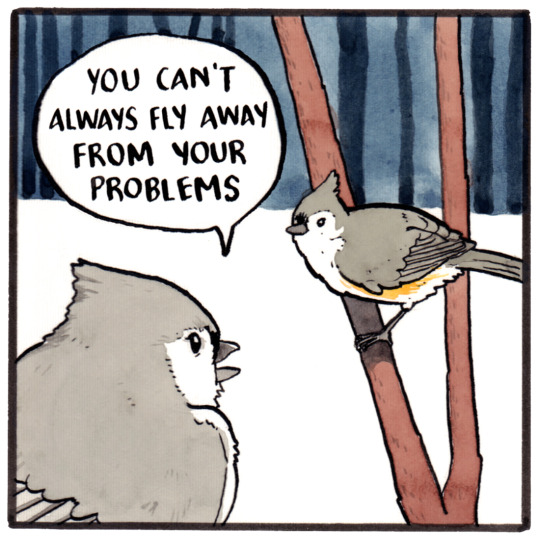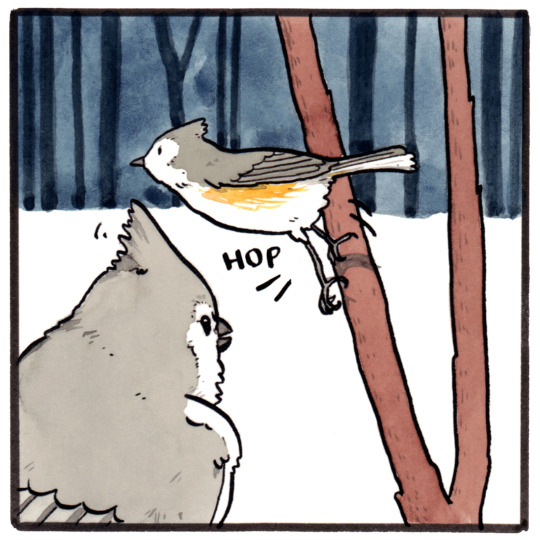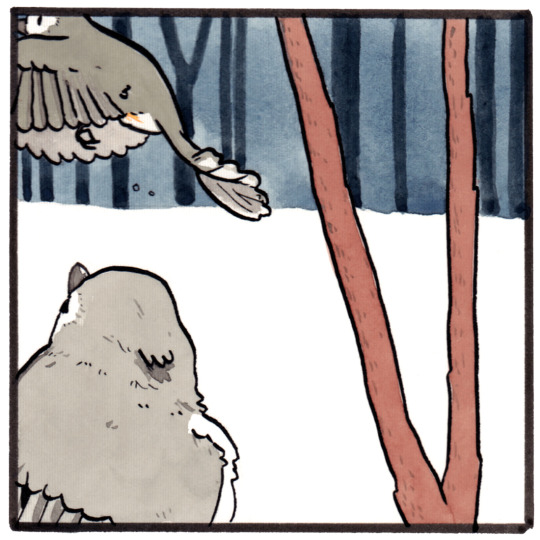Text
0 notes
Photo

Rolling in the nonsense, deploy the fantasy For the horrors I find hard to believe
593 notes
·
View notes
Text
Quick Mini overview
Mini is a constructed language created by S.C. Gruget. It has 1000 words and a simple but useful grammar. Mini’s sentences are structured in the subject, verb, object manner:
mi i manja a poma - I eat an apple.
Given that words can function like any other words (that is, a verb also works as noun, for example), Mini uses particles to mark the role of a word in a sentence:
i: introduces the verb.
a: introduces direct object & noun complement.
e: introduces adjective complement.
So:
mi i manja a manja - I eat food.
tu e rapi - You are fast.
It uses the letters a, b, d, e, f, g, i, j, k, l, m, n, o, p, r, s, t, u, v. Pronunciation of consonants is the same as in English, vowels sound a bit more like in Spanish. Stress of a word always falls on the second to last syllable.
“a” as in map.
“e” as in level.
“i” as in meet.
“o” as in more.
“u” as in balloon.
“g” as gift.
Tense and verb aspect is unspecified, but if needed it is built in combination with the i particle and another word:
mi i de manja a oranje - I ate an orange.
mi i manja a oranje - I eat an orange.
mi i go manja a oranje - I will eat an orange.
mi i en manja a oranje - I am eating an orange.
mi i ave manja a oranje - I have eaten an orange.
mi i de ave manja a oranje - I had eaten an orange.
mi i go ave manja a oranje - I will have eaten an orange.
i manja a oranje! - Eat an orange!
go-i manja a oranje - To eat an orange.
mi i da manja a oranje - I would eat an orange.
mi i pasa manja a oranje - I used to eat oranges.
mi i debe manja a oranje - I should eat an orange.
en-i manja a oranje e bon - Eating oranges is good.
Di oranje e de-i manja de mi - This is orange is eaten by me.
For negation precede the word no to that which you need negated:
mi i de no manja a da oranje - I did not eat that orange.
For an adjective precede a noun with a word. For an adverb follow a verb with o and a word:
mi i manja o rapi a oranje poma - I eat quickly an orange apple (the apple has the colour orange).
Possessives are just pronouns and subjects used as adjectives:
tu i manja a mi poma - You eat my apple.
The conjunctions are an, u:
mi i manja a poma an oranje - I eat an apple and an orange.
mi i go manja a poma u oranje - I will eat an apple or an orange.
Dependent and subordinating clauses also have their own words to mark their role:
mi i pensa ke tu i debe manja a poma - I think that you should eat apples.
mi i manja a poma ka mi i kan - I eat apples because I can.
mi i manja a poma vile tu i manja a oranje - I eat an apple while you eat oranges.
Tamen mi i manja poma, mi i no favo a si - Although I eat apples, I don’t like them.
Simple yes or no questions just add a ?:
tu i manja a oranje? - Do you eat oranges?
Open questions use ke in a variety of ways:
tu i manja a ke? - What do you eat?
ke man i manja a oranje - Who eats oranges?
tu i manja e ke loke? - Where are you eating?
si i manja en ke tempo? - When is he eating?
tu i manja e ke rason? - Why do you eat?
mi i debe manja a ke mui? - How much should I eat?
si i manja e ke moda? - How does she eat?
Numbers work as adjectives and are composed from left to right:
nulo - 0.
uno - 1.
duo - 2.
san - 3.
fo - 4.
penta - 5.
sita - 6
seven - 7.
ba - 8.
nin - 9.
ten - 10.
ten nin poma - 19 apples.
sento - 100.
kilo - 1,000.
duo-ten-san-ranko - 23rd.
You can create new words by composing them:
di-dia - today.
dimenti-neso - forgiveness.
duo-ranko-go-fini - Second to last.
0 notes
Text
0 notes
Text
A translation of Mercury and the woodman by Aesop to Mini
Merkurius an kata-igi-man
Pove kata-igi-man i de en kata a igi nea limi de dipa pisina en foreta. Si-kosa e de tadi en dia an kata-igi-man e de fatiga. Si-viro i de labora de leva-sole and si-viro jeti e de no so sure sama si-ale e de rano da maten. Den, ake de-i lubi an de-i vola de si-viro mano go pisina.
Kata-igi-man e de nulo-arapan. Da ake de-e si-viro solo orijen de labora, an si-viro i de no ave a sufi mone ke si-viro i kan kopen a nu ake. Sama si-viro de-i kipa, en-i elika a si-viro mano an en-i lagima, Merkurius, deo, i de apara o subita an i de roga a duro e ke. kata-igi-man i de dire e ke de-i pasa, an subita ubuntu Merkurius i de dive en pisina. Ven si-viro i-de apara e gen, si-viro i de ave a vunda jin ake.
“Di e tu ake?” Merkurius i de roga a kata-igi-man.
“No,” de-i reaki vere-fule kata-igi-man, “da e no mi ake.”
Merkurius i de pone a jin ake en litora an si-viro i de jumpa o gen en pisina. Di evento, si-viro i de pota a ake de silara, pero kata-igi-man, gen, i de dire ke si-viro ake e de medi and si-kosa i de ave a igi punjo.
San-ranko tempo, Merkurius i de dive, an ven si-viro i-de apara e gen, si-viro i de ave a esato ake ke de-i ave en lose.
Pove kata-igi-man i de joli o mui ke si-viro ake de-i deteki an si-viro i de no kan o sufi a ubuntu deo. Merkurius e de mui joli ke kata-igi-man vere-fule-neso.
“Mi i venera a tu vere-fule-neso,” si-viro i de dire, “an sama dona tu i kan ave a ale san ake, jin, silara an tu ego ake.”
Joli kata-igi-man i de baka-go a si-viro domo kon si-viro dona, an sun saga de si-viro o bon luki de-i savi de man-ale en vila. Den, a de mui kata-igi-man en vila i en keredo ke si-ale i go kan gana o fasile a sama bon luki. Si-ale i de go o rapi a foreta, uno e di, uno e da, an i en osura a si-ale ake en jari, si-ale i de mentira-make lose a ake. Den, si-ale i de lagima an jeritan an voka a Merkurius ke si-viro i go ade a si-ale.
An ja, Merkurius de-i apara, uno-ranko go di si-uno, den go da si-uno. Si-viro i de demo a jin ake go kada si-uno, an kada si-uno i de anunsi o esita ke da ake a de si-uno ke si-ale i de lose. Pero Merkurius i de no dona a jin ake go si-ale. O no! Tamen si-viro i de dona a duro jeti en kapo kon ake go kada kata-igi-man an i de sende a si-ale go domo. An ven, sige dia, si-ale i de baka-go jage a si-ale ake, ake e de no da.
Vere-fule-neso e da ma bon ajenda.
Mercury and the woodman
A poor Woodman was cutting down a tree near the edge of a deep pool in the forest. It was late in the day and the Woodman was tired. He had been working since sunrise and his strokes were not so sure as they had been early that morning. Thus it happened that the axe slipped and flew out of his hands into the pool.
The Woodman was in despair. The axe was all he possessed with which to make a living, and he had not money enough to buy a new one. As he stood wringing his hands and weeping, the god Mercury suddenly appeared and asked what the trouble was. The Woodman told what had happened, and straightway the kind Mercury dived into the pool. When he came up again he held a wonderful golden axe.
“Is this your axe?” Mercury asked the Woodman.
“No,” answered the honest Woodman, “that is not my axe.”
Mercury laid the golden axe on the bank and sprang back into the pool. This time he brought up an axe of silver, but the Woodman declared again that his axe was just an ordinary one with a wooden handle.
Mercury dived down for the third time, and when he came up again he had the very axe that had been lost.
The poor Woodman was very glad that his axe had been found and could not thank the kind god enough. Mercury was greatly pleased with the Woodman’s honesty.
“I admire your honesty,” he said, “and as a reward you may have all three axes, the gold and the silver as well as your own.”
The happy Woodman returned to his home with his treasures, and soon the story of his good fortune was known to everybody in the village. Now there were several Woodmen in the village who believed that they could easily win the same good fortune. They hurried out into the woods, one here, one there, and hiding their axes in the bushes, pretended they had lost them. Then they wept and wailed and called on Mercury to help them.
And indeed, Mercury did appear, first to this one, then to that. To each one he showed an axe of gold, and each one eagerly claimed it to be the one he had lost. But Mercury did not give them the golden axe. Oh no! Instead he gave them each a hard whack over the head with it and sent them home. And when they returned next day to look for their own axes, they were nowhere to be found.
Honesty is the best policy.
0 notes
Text
0 notes
Photo
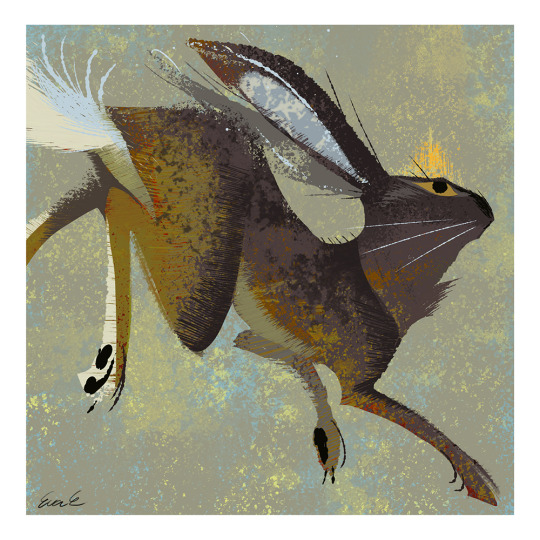

El-ahrairah and Black Rabbit of Inlé
evelmiina.com / Twitter / Artstation / Instagram / Prints / Youtube
12K notes
·
View notes
Photo

magic!
prints: https://www.inprnt.com/gallery/guilhernunes/magician-capybara/
1K notes
·
View notes
Text
0 notes
Text
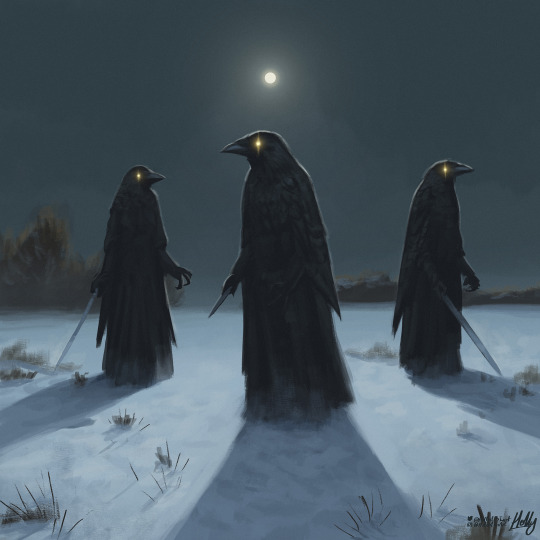
Standing in the Snow on the Longest Night
My last piece this year!
3K notes
·
View notes
Text
0 notes
